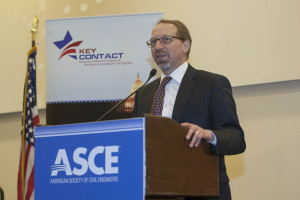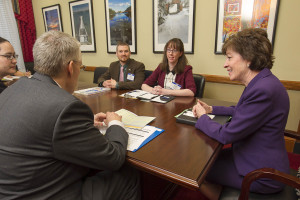ASCE Members Meet With US Lawmakers
March 30th, 2015 | By: Becky Moylan
“Let’s win this for our country,” proclaimed ASCE President Robert D. Stevens, PhD, PE to a room of nearly 200 ASCE members who descended on the nation’s capital to encourage members of Congress to fix the Highway Trust Fund last week. The group visited Washington, D.C. as part of the 15th annual ASCE Legislative Fly-In, which offers the opportunity for ASCE members to engage with their elected representatives and senators about the policy issues that impact civil engineers. The two-day event included briefings on federal legislative issues, including the Water Resources Reform and Development Act (WRRDA) appropriation process and the need for Congress to pass a long-term transportation bill this year. To further the conversation on transportation, attendees were addressed by the U.S. Department of Transportation Under Secretary for Policy, Peter Rogoff on Tuesday evening and Congressman Earl Blumenauer (D-OR) on Wednesday morning. Rogoff thanked the group for making the journey to Washington to highlight this important issue, remarking “No one is closer to infrastructure than you and your colleagues.” He then outlined the reasons America needs a bolder plan for the future to meet the demands of a growing population. Despite the major maintenance needs in addition to needs to account for future growth, the transportation network is, as Rogoff put it, “starved for funds.” Rogoff warned that with 32 short-term extensions, local and state leaders tend to stop planning long-term projects, which can take many years of planning and building. “When you have 32 short term extensions people lose their vision. Why would you plan a project…if you don’t know the federal government will pay its bills eight months hence?” he asked rhetorically. This is why it is so important to fix the Highway Trust Fund in a way that increases funding: so that we can move beyond the status-quo, and start shaping the future of our transportation network. For example, Rogoff pointed to the Administration’s GROW AMERICA Act, which increases funding for public transit to ensure it can be upgraded to meeting growing demand. The administration is pushing hard for an increase in investment, because they believe that given the political challenges facing this legislation at the end of it there should at least be positives to show for it. “It is no victory to maintain current levels of spending,” said Rogoff. Ultimately, Rogoff had cautious optimism that there could be a multi-year bill passed this year. “Mayors and governors are starting to sound off this is no way to run this program. You can say it with even more credibility,” he concluded. Congressman Blumenauer (D-OR) shared an equally compelling message. The $3.6 trillion investment need estimated by ASCE is “within our capacity and … will repay for itself” he said, adding that it would bring down the deficit in the long term. Blumenauer highlighted many benefits that would result from increasing investment in transportation, including reducing time wasted sitting in traffic, enhancing quality of life for every family, and creating jobs in a range of opportunities. The Congressman earlier this year proposed the UPDATE Act, HR 680, which would raise the rate of the gas tax by five cents for the next three years then tie it to inflation to address the funding deficit in the Highway Trust Fund. When he introduced the bill, he had 20 co-sponsors and endorsements from many organizations, including ASCE. He acknowledged that many of his colleagues are wary of repercussions from voting for a tax increase. To help them find the political courage, Blumenauer told the Fly-In attendees to reassure them that there is sufficient political cover. “Ninety-eight percent of the legislators that voted to increase the gas tax [on the state level] got re-elected in 2014. Make it clear that what ends the career is allowing the country to fall apart if they can’t meet the needs of your community,” said Blumenauer. As further evidence of the historically bipartisan nature of infrastructure investment, Blumenuaer recounted when President Reagan called on Congress to more than double the gas tax in his 1982 Thanksgiving address. Congress responded by doing so when they returned to Washington after the holiday. In conclusion, Blumenauer shared that he counts on ASCE for continued support on this issue and to help get a bill passed: “I hope we’ll be at a signing ceremony in the future for a six-year re-authorization.” The 200 ASCE members in attendance then headed to Capitol Hill to meet with members of Congress and their staffs of 46 states and the District of Columbia. Following the meetings, the group reconvened at a reception in the U.S. Capitol Cannon Caucus Room featuring a Dream Big!: Engineering Wonders of the World theme in anticipation of the ASCE-sponsored IMAX film coming out next year. ASCE members and Congressional staffers were able to continue their conversations from the afternoon while networking and having some fun taking photos in front of a green screen photo booth, which then transformed the background into iconic infrastructure backdrops. During the proceedings, Sen. Barbara Boxer (D-CA) and Rep. Bill Shuster (R-PA) were both presented with awards naming them Honorary Fellows of the Society. Sen. Boxer was selected in honor of her more than 30 years of public service, which includes 24 in the U.S. Senate. As Chairwoman of the Environmental and Public Works Committee, she led the effort to enact the Water Resources Reform and Development Act (WRRDA) and the Moving Ahead for Progress in the 21st Century Act (MAP-21). Rep. Bill Shuster earned ASCE’s recognition for his efforts as an eight-term member of the House of Representatives. As Chairman of the Transportation & Infrastructure Committee, he helped shepherd the passage of MAP-21 and steered the effort to enact WRRDA. Including last week’s inductees, there have only been 38 Honorary Fellows named by the Society. Also recognized during the Fly-In were the winners of the inaugural Outstanding Civil Engineer Advocate of the Year awards, recognizing an individual and group who went above and beyond in advocating for ASCE’s issues in the past year. This year’s winners were Darren Benoit of New Hampshire and the Louisiana Section. The two days encapsulated the resolve the American Society of Civil Engineers has to encourage Congress to fix the Highway Trust Fund with a long-term, sustainable solution. To contribute in this effort, sign up to be a Key Contact today.Tags: advocacy, fly-in, highway trust fund
Comments Closed
Outstanding Civil Engineer Advocates
February 28th, 2015 | By: Becky Moylan
For the first time, ASCE is formally recognizing an individual member and a team who are dedicated to saving America’s infrastructure and promoting ASCE’s Priority Issues through building relationships with lawmakers. The Outstanding Civil Engineer Advocate of the Year Award winners, Darren Benoit and the Louisiana Section, will be recognized for their achievements at ASCE’s Legislative Fly-In, an annual two-day event where ASCE members promote the civil engineering profession to their state’s U.S. Congressional representatives. Darren Benoit, of New Hampshire, has advocated on surface transportation, dam safety, and other issues at both the state and federal levels. Among his most notable accomplishments in years of building relationships with lawmakers and educating the public, Darren testified in front of the New Hampshire state legislature about the need for an increased investment in transportation funding. Last year, New Hampshire’s representatives and senators responded by raising the state’s fuel tax for the first time in two decades. In 2011, he led the New Hampshire Section of ASCE in its release of the Report Card for New Hampshire’s Infrastructure and has again taken the lead on updating the report. The Louisiana Section of ASCE began its advocacy efforts for better infrastructure throughout the state with the release of the 2012 Report Card for Louisiana’s Infrastructure. To follow up on the efforts of the Report Card, which gave the state’s infrastructure a GPA of “C-,” the Section joined forces with other like-minded groups to hold the first-ever Infrastructure Awareness Day at the state capitol. The event included a luncheon with lawmakers to discuss the importance of infrastructure and the need for increased investment. Four days later, state Sen. Robert Adley testified on his proposal to better fund transportation. Similarly, state Rep. Karen St. Germain has since proposed legislation that would transfer vehicle sales tax revenue to transportation, boosting investment by more than $400 million a year. Darren and the Louisiana Section, along with all our Key Contacts, represent ASCE’s Priority Issues to America’s lawmakers. Congratulations to Darren and the Louisiana Section for being our inaugural award winners. Keep up the great work!Tags: advocacy, advocacy profile, Advocate, advocate profile
No Comments »
ASCE Seeks Nominations for Outstanding Civil Engineer Advocate of the Year
October 7th, 2014 | By: America's Infrastructure Report Card
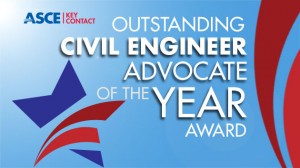 Have you gone above and beyond to represent the civil engineering profession before your elected officials? You could be our next Outstanding Civil Engineer Advocate of the Year! If you are one of the many ASCE Key Contacts actively building relationships with and educating your elected leaders on issues important to the civil engineering profession, we would like to recognize your efforts.
Have you gone above and beyond to represent the civil engineering profession before your elected officials? You could be our next Outstanding Civil Engineer Advocate of the Year! If you are one of the many ASCE Key Contacts actively building relationships with and educating your elected leaders on issues important to the civil engineering profession, we would like to recognize your efforts.
- Nominate an individual (including yourself!)
- Nominate a group (such as a Section, Branch, or Younger Member Group)
Tags: advocacy
No Comments »
Advocate Profile: Peter S. Merfeld, P.E., M.ASCE
August 27th, 2014 | By: Becky Moylan
Peter S. Merfeld, P.E., M.ASCE is a member of the Maine Section. He has exhibited leadership experience as section president, Maine Report Card chair, and through work on the national Report Card for America’s Infrastructure. He is also a Board member of IBTTA (International Bridge, Tunnel and Turnpike Association). These roles led him to become an advocate for infrastructure investment on the state and federal levels, an issue that is particularly important currently as the federal Highway Trust Fund heads toward insolvency. As the chief operations officer at the Maine Turnpike Authority, Peter offers day-to-day operational guidance to the Highway & Equipment Maintenance, Engineering & Building Maintenance, and Public Safety departments. He also prepares, plans and oversees the annual Maintenance and Capital Program budget. His role requires him to work closely with the Maine DOT to ensure inter-agency communication and coordination, and review Turnpike policy needs and changes. If you are interested in becoming involved in ASCE’s Key Contact program and promoting the profession through advocacy, you can learn more information and sign up at asce.org. How did you become interested in and get involved in advocacy for your profession? In 2006 as President of the Maine Section, fellow ASCE member and Past-President Phil Dunn gave a report that Michael Michaud, Maine Congressman from the 2nd district had asked Phil “Where is the Maine Report Card?” while he was attending the Fly-In. The Report Card on America’s Infrastructure was seen as a credible tool in providing policy makers with facts about the status of our roads, bridges, and other important infrastructure. After talking with others in Maine section ASCE leadership, it was agreed that having a Maine Report Card could be a great tool for Maine civil engineers to engage our policy makers in a conversation about infrastructure funding. An area that we, as a Section, had not done a great job up to that point. The local Report Card though would be a major undertaking. Due to overwhelming support from the section, I made the easy decision that once I completed my tour as Past-President, in fall 2007 I would take on the role of chair of the committee that would develop and create a Report Card for Maine’s Infrastructure.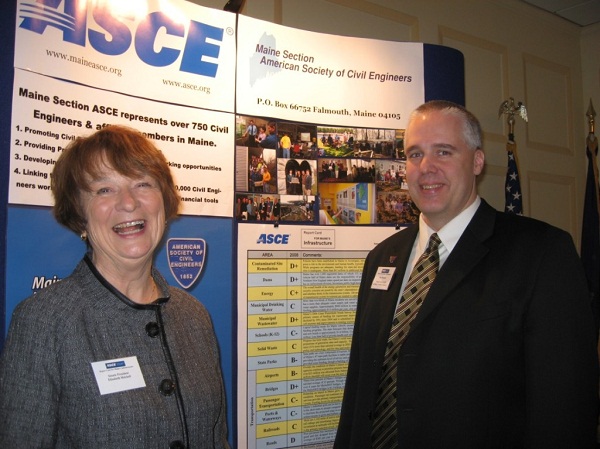
Peter Merfeld (right) and Maine Speaker of the House and former Senate President Elizabeth Mitchell at 2008 release of the Report Card for Maine’s Infrastructure
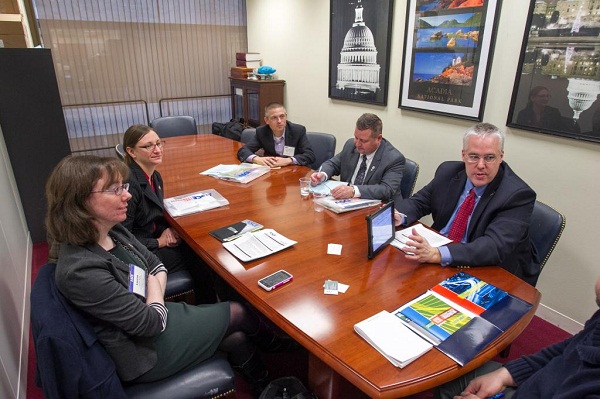
Maine delegation in 2014 with Peter Merfeld presenting the 2013 Report Card for America’s Infrastructure app to Senator Susan Collins (Maine) staff member John Kane.
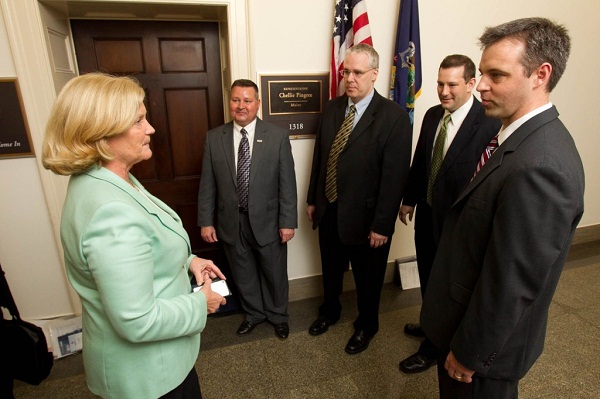
Congresswoman Chellie Pingree (Maine) speaks with ASCE representatives from Maine in March 2012: Greg Blake, Peter Merfeld, Jason Gallant and Walter Fagerlund.
Tags: advocacy, advocacy profile, Maine
No Comments »



 */ ?>
*/ ?>




